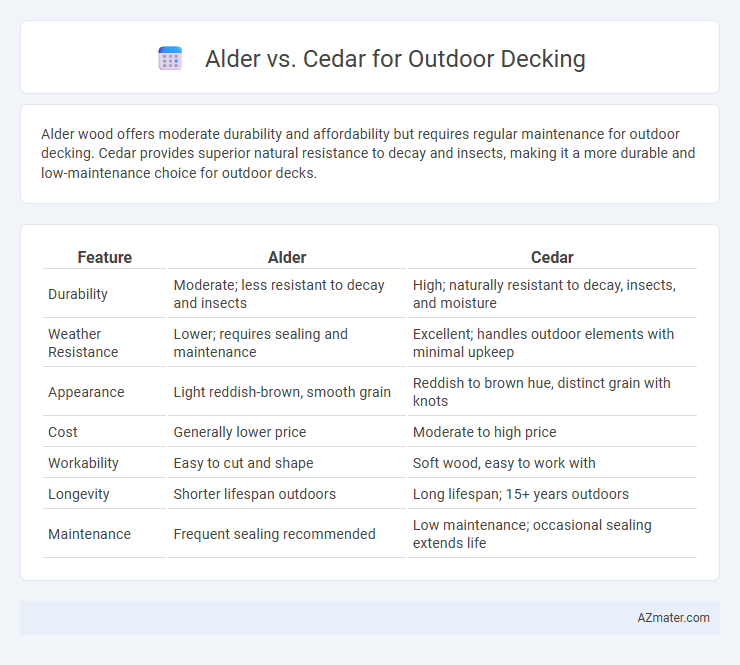Alder wood offers moderate durability and affordability but requires regular maintenance for outdoor decking. Cedar provides superior natural resistance to decay and insects, making it a more durable and low-maintenance choice for outdoor decks.
Table of Comparison
| Feature | Alder | Cedar |
|---|---|---|
| Durability | Moderate; less resistant to decay and insects | High; naturally resistant to decay, insects, and moisture |
| Weather Resistance | Lower; requires sealing and maintenance | Excellent; handles outdoor elements with minimal upkeep |
| Appearance | Light reddish-brown, smooth grain | Reddish to brown hue, distinct grain with knots |
| Cost | Generally lower price | Moderate to high price |
| Workability | Easy to cut and shape | Soft wood, easy to work with |
| Longevity | Shorter lifespan outdoors | Long lifespan; 15+ years outdoors |
| Maintenance | Frequent sealing recommended | Low maintenance; occasional sealing extends life |
Introduction: Comparing Alder and Cedar for Outdoor Decking
Alder and cedar are popular wood choices for outdoor decking, each offering distinct benefits in durability, appearance, and maintenance. Cedar naturally resists decay and insects due to its aromatic oils, making it ideal for outdoor exposure, while alder provides a smooth, fine grain but requires more protective treatment to withstand weather. Understanding the differences in weather resistance, color stability, and longevity helps in selecting the best wood for a durable, attractive outdoor deck.
Wood Characteristics: Alder vs Cedar
Alder wood features a fine, uniform texture with a straight grain, offering moderate durability and a smooth finish ideal for outdoor decking applications. Cedar is naturally resistant to decay and insect damage due to its high levels of natural oils, with a coarse but attractive grain pattern that weathers well in external environments. The softness of alder allows for easier machining and a warm, reddish hue, whereas cedar's superior resistance to moisture and rot makes it a preferred choice for long-lasting outdoor decks.
Durability and Weather Resistance
Cedar is renowned for its superior durability and natural resistance to moisture, insects, and decay, making it an excellent choice for outdoor decking. Alder, while aesthetically appealing with its fine grain and reddish hue, lacks the inherent weather resistance of cedar and requires more maintenance to withstand outdoor conditions. Choosing cedar for outdoor decking ensures longer-lasting performance and reduced susceptibility to warping, rot, and insect damage compared to alder.
Appearance and Color Differences
Alder wood features a rich, reddish-brown hue with subtle grain patterns that deepen and warm over time, making it ideal for a vibrant, rustic outdoor deck look. Cedar displays a lighter, honey-toned color with distinct knots and a natural resistance to decay, providing a more classic and weather-resistant aesthetic. Both woods offer unique visual appeal, but alder's uniform texture contrasts with cedar's pronounced grain variations, influencing deck design preferences.
Maintenance Requirements
Alder wood requires more frequent maintenance for outdoor decking due to its softer nature and susceptibility to moisture, which can cause warping or rot without regular sealing and staining. Cedar offers superior natural resistance to decay and insect damage, reducing the need for constant upkeep while maintaining structural integrity. Properly sealed cedar decks can last longer with minimal maintenance, making cedar a more durable and cost-effective choice for outdoor decking projects.
Cost Comparison: Alder vs Cedar
Alder wood generally costs less than cedar, making it a budget-friendly option for outdoor decking projects. Cedar, although more expensive, offers superior natural resistance to rot and insect damage, potentially reducing long-term maintenance costs. Choosing between alder and cedar depends on balancing upfront material expenses with durability and upkeep requirements.
Environmental Impact and Sustainability
Cedar is widely favored for outdoor decking due to its natural resistance to decay and pests, reducing the need for chemical treatments and enhancing sustainability. Alder, although less durable outdoors, grows faster and is more abundant, offering a renewable resource with a smaller carbon footprint if sourced responsibly. Choosing cedar from FSC-certified forests supports long-term ecological balance, while alder's quicker growth rate can contribute to sustainable forestry practices when managed properly.
Installation and Workability
Alder wood offers easier installation and superior workability for outdoor decking due to its softer texture and consistent grain, allowing for smoother cutting, shaping, and fastening. Cedar, while slightly harder, provides natural resistance to decay and insects but may require more careful handling and specialized tools to prevent splintering during installation. Both woods benefit from pre-drilling and sealing, though alder's responsiveness to stains and finishes enhances its versatility in customized decking projects.
Lifespan and Long-term Performance
Cedar is known for its exceptional natural resistance to decay, insects, and moisture, often lasting 15 to 30 years in outdoor decking applications with minimal maintenance. Alder, while attractive and cost-effective, generally has a shorter lifespan of around 10 to 15 years due to its softer wood structure and lower resistance to weathering. For long-term performance, cedar's durability and stability under varying outdoor conditions make it a superior choice over alder for decking projects.
Which Wood is Best for Your Outdoor Deck?
Cedar is generally the best choice for outdoor decking due to its excellent natural resistance to moisture, decay, and insect damage, making it highly durable in various weather conditions. Alder, while attractive with a fine, even grain and rich reddish-brown color, lacks the natural rot resistance and weather durability cedar provides, requiring more maintenance and protective treatments. For long-lasting, low-maintenance outdoor decks, cedar's strength, stability, and natural preservatives make it the superior wood option.

Infographic: Alder vs Cedar for Outdoor Decking
 azmater.com
azmater.com